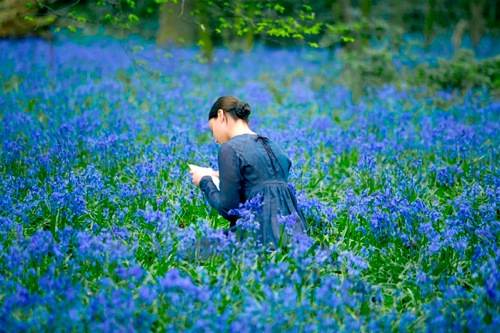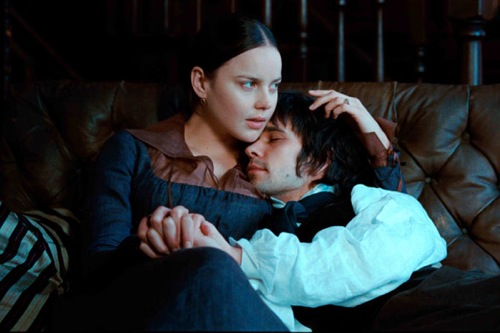
By David Ross. Has there ever been a good film about a writer? Mrs. Parker and the Vicious Circle (1994) was respectable enough, as I remember it, but generally film has no idea how to approach lives that are largely interior, with driving purposes that are inconveniently invisible and inscrutable. In consequence, film tends to emphasize the gossipy and scandalous, dwelling on the externals of sexual deviancy, alcoholism, and nervous breakdown.
Film has been particularly clumsy in its attempts to deal with the romantics, in whose case the temptation to sensationalize is enormous. Percy and Mary Shelley receive the star treatment in Ken Russell’s Gothic (1986), while Wordsworth and Coleridge feature in Julien Temple’s Pandaemonium (2000), the latter starring the diminutive Scotsman John Hannah, last seen being chased by mummies, as Wordsworth. Both films are creative disasters and intellectual insults even by the debased standards of Hollywood. Pandaemonium is to literary biopic what Plan 9 from Outer Space is to science fiction: a film so unbelievably stupid that it becomes incredible in its own way. The less said about these films the better. The BBC production Byron (2003) is far more respectable, but suffers the reverse problem: its fidelity to historical and period detail is almost pedantic, and it maintains a studious emotional distance from its subject. It is a live-action encyclopedia entry, the only mildly boring film ever made on the themes of omnivorous sexuality and incest.
Jane Campion’s Bright Star (2009), which tells the story of Keats’ doomed romance with Fanny Brawne, is surer of itself and sounder in its approach. Where Russell and Temple indulge in shuddering ejaculations of mayhem and mania, Campion recognizes that the challenge is to contain and compress the intrinsic melodrama of her story. She smartly attempts this work by shading her film in muted browns and grays (the true colors of England by the way); by utilizing all manner of strategic occlusion and interruption; and by interjecting into nearly every scene the acidic and not entirely endearing personality of Charles Brown, Keats’ friend and companion. When the syrup begins to bubble over, Campion knows exactly how and when to turn down the heat.

Even more importantly, the film feels psychologically and emotionally consistent with the poems. Campion’s Keats inevitably becomes a favorite playmate of the younger Brawne children – and he does perform an annoying Scottish jig at Christmas dinner – but he is neither the ethereal and evanescent sprite (the Keats of Shelley’s “Adonais”), nor the paragon of innocence and good cheer (the Keats of Yeats’ “Ego Dominus Tuus”). Played admirably by Ben Whishaw, this Keats is tough in his way, self-controlled, decent, decorous, and private. Where Russell and Temple insist on the correlation between insanity and genius, Campion underscores Keats’ self-awareness and his understated but powerful and consistent intelligence: in short, his fundamental sanity. I consider this a convincing thesis about the kind of personality that produced the poems.
Campion’s Fanny Brawne, meanwhile, seems the kind of woman who might have appealed to the man who wrote the poems. She is a woman not of passion, but of passionate character: character qualifies and directs passion, making her far more interesting and believably Georgian than the stereotypical melting or bursting damosel of romantic cliché. Abbie Cornish plays the part superbly and instantly establishes herself as an actress who can project a degree of intelligence and literacy in the tradition of Helena Bonham Carter and Keira Knightley.
I’m not enough of a Keats scholar to say whether the film is minutely correct in all its details, but the advisory help of Keats’ biographer Andrew Motion suggests that it is at least roughly correct. The film tends to downplay the alleged flirtatiousness and dress obsession that made Fanny unpopular among Keats’ friends, but this is within the bounds of reasonable interpretation, it seems to me. The film does engage in at least one petty deception. The closing credits inform us that Fanny “kept Keats forever in her heart” (or something to this effect) and that she never removed her engagement ring, implying that she spent the rest of her life faithfully mourning her lost love. In fact, as the Oxford Dictionary of National Biography notes:
After Keats’s death, Fanny remained in Hampstead and mourned him through the 1820s, befriending his sister as she had promised him she would. After her mother’s death in 1829 Fanny became financially independent and, on a visit to France in 1833, in Boulogne met Louis Lindo (later Lindon; 1812-1872), whom she married on 15 June 1833. Of Spanish or Portuguese extraction and from a wealthy Jewish merchant and banking family, Louis Lindon seems to have held a number of positions, including working as an officer for the British Legion in Spain and as a wine merchant in London later in life. Until the 1850s, when they settled in London, the Lindons lived on the continent, especially in Germany, where Fanny gave birth to two sons and a daughter. Fanny died at 34 Coleshill Street, Pimlico, London, on 4 December 1865.
Posted on June 19th, 2010 at 11:18pm.
There’s a brilliant movie about a writer called Shadowlands, based on C. S. Lewis starring Anthony Hopkins. It’s one of the best movies I’ve ever seen. Watch it if you can.
David – what about the classic Hollywood film “The Barretts of Wimpole Street” about the poets Elizabeth Barrett Browning and Robert Browning? Perhaps classic Hollywood was able to handle the subject of Romantic poets better than the Hollywood filmmakers today? “The Barretts of Wimpole Street” was a highly acclaimed film in its day, and was produced by the legendary Irving Thalberg.
Has anyone seen the Sylvia Plath movie starring Gwyneth Paltrow or the Iris Murdoch movie starring Judi Dench/Kate Winslet? I understand Plath and Murdock aren’t Romantic poets, but they are literary figures and I’m curious if these movies are any good.